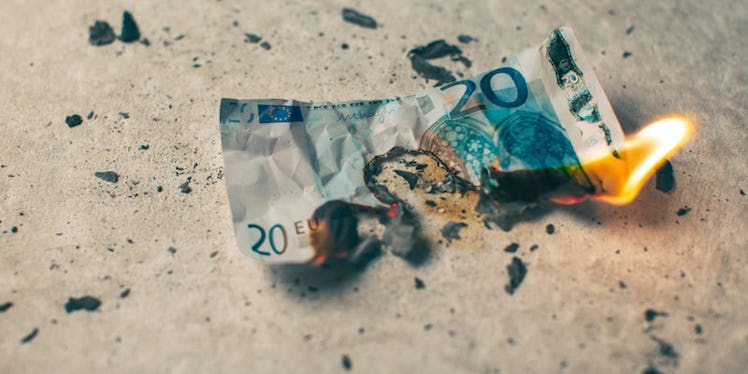
When It's Over: How To Cope With Your Thoughts After A Bad Breakup
The silence: That’s probably the hardest part. There's the stillness of the cell phone, the unspoken hellos and the missed comforts.
You tell yourself it doesn’t bother you — you were just checking your email, you weren’t hoping to find a missed text.
You blast the music to muffle your incessant thoughts, take two Advil to numb the throbbing and then turn up the volume.
The heavy feeling never really goes away; sometimes it softens, but it’s always there. So, you eat, but the French fries, the ice cream and the alcohol don’t fill you how you want them to.
You feel puffy and can see the pounds accumulating on your sides.
Eventually, you end up feeling heavier than before. The echoing memories are still there and the headaches don’t stop. You pop two more pills, turn up the volume again and ignore the loud ringing in your ears.
After a while, you start to wonder why it is that you’re really upset. Is it really because of him (or her)?
Because the expectations you had for him, yourself and your relationship didn't align with how things turned out? Or, is it because something was missing before him?
You had this small, hollow feeling before and with him, that feeling subsided.
That possibility ended up being worse — realizing you weren’t fully okay before him, that you couldn't make yourself happy on your own — because now, you have to go back to being that way.
He, for some reason, was able to give you some sense of stability, and you got used to it. For that moment, you could trust in the consistency of something: the texts, the gentle reassurances, the company, the sex.
You didn’t even realize what was happening and if you did, you didn’t care because the growing dependence was nice; it felt good to be wanted, to soften and to expose yourself.
...And then, it just went away.
You ask yourself how you can really be mad when he let you know who he was, what he was about. But, you are mad because there was something there that let you believe you were more.
Even more so, you’re mad because you chose to ignore the signs, you were even willing to mold yourself into the role you were supposed to play, all because you would rather have pieces of him than nothing.
It’s about more than being mad. It’s about the disappointment, which is the worst kind of hurt.
It's the disappointment you feel in yourself: Having to face the fact you are capable of being so weak that you could allow someone to have such an effect on your well-being.
You were supposed to be stronger than that. The I-don’t-need-a-man mentality you had is shattered just because of the guy (and there will be more who will make you feel this way again).
Maybe you do need someone and maybe you want someone to share in moments with, to hold and to be held by, to love and be loved by.
There’s the disappointment you feel in him for hurting you, even if he doesn’t realize it.
It gives you a headache just trying to wrap your head around the fact that he could treat you so poorly and cut you off so coldly.
How could he be the same person who was just shamelessly giving you affection in public and massaging the hard day out of your tight muscles?
He said you meant something to him; he said and showed he cared about you. But, you're also disappointed because he was everything you wanted him to be; he lived up to everything you thought he would be, and then he stopped.
And yet, even after all that, you can’t seem to quiet the part of you that still wants him.
Eventually, you realize this isn’t even just about him (or her). It’s about all of them; all the people to whom you gave bits of yourself before they let you down.
It's about the ones who you thought loved and respected you just as much as you did them.
From when you are little, you are taught to treat people how you want to be treated. And if you do, people will treat you well in return. But, it’s just not the case.
You find out people will hurt you, disappoint you, and even disappear on you; that much is inevitable.
People always say, “Don’t let other people determine your happiness.” How can you be expected to do that when so much of your happiness comes from the people around you? What is your contentment if not for those connections and those shared moments?
They say you should forget about the people who overlook you, your feelings and your worth, but it’s so much easier to hear the silence of those you care for, rather than the noise of those who care for you.
And in this moment, right now, that silence is deafening.